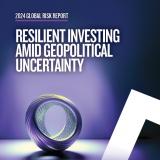The convergence of great-power competition, conflicts in Europe and the Middle East, and major elections around the world has made geopolitics a more prominent feature in the investment outlook. In an uncertain world with heightened geopolitical risks, understanding how to navigate shocks and assemble resilient portfolios is more crucial than ever before. With the right strategies, investors can manage risk and capture emerging opportunities across asset classes and regions.
PGIM brought together experts from its affiliates to discuss the impact of policy shifts on markets and the global economy, opportunities and challenges in emerging markets, and how the global battle for technological supremacy is contributing to data centers’ rapid growth. The following is a summary of the discussion.
- Opportunities and risks amid fragmentation: The US and China are engaged in greater competition, particularly around intellectual property and technology such as semiconductors. This issue has already impacted corporate earnings, highlighting why it is important for investors to factor the US-China relationship into portfolio decisions. While supply-chain risks stemming from the war in Ukraine have been managed, the situation still remains unresolved and could result in further disruptions. Geopolitical risk has always been important to EMs, but it has taken on a greater level of relevance in the current environment. The outcome of the US election, and its potential impact to EM economies, will be front and center. For example, new US tariffs could be detrimental to EMs by curbing global trade and financial flows. However, supply-chain reorientation can support growth in EMs that use the geopolitical tug-of-war to their advantage. India has emerged as one alternative for investors and trade partners seeking diversification amid increased tensions between the West and China. Vietnam has also capitalized on the rerouting of supply chains.
- Impact of policy shifts and uncertainty: Global competition has set the stage for the reemergence of industrial policy, with the US and Europe employing subsidies and other incentives to support strategic domestic industries. Despite this reshoring drive, there are constraints on industrial policy, including the high costs involved, elevated debt levels globally, and a lack of skilled workers in certain markets. With these constraints in mind, policymakers will likely prioritize manufacturing and technology that is critical to national security. The realignment of supply chains will continue, but it could be more targeted going forward. Mario Draghi’s report for the European Commission laid out proposals to reinvigorate the region’s economy, but there remains debate within European governments over the right course of action. An election victory by Donald Trump could provide a catalyst for Europe to implement elements of the Draghi report if trade tensions with the US escalate.
- Data centers’ role in geopolitics: Data centers have experienced significant growth, fueled by cloud computing and generative AI. Constraints on supply and strong demand have made rents attractive to investors. Amid headlines about the rise of AI, the role that data centers play in national security, energy policy and the competition over semiconductor production might be overlooked. In the US, there is growing interest in exploring nuclear power as one option for securing a reliable source of energy for data centers. Governments are also increasingly concerned about data security, leading to high demand in countries that were not traditionally strong markets for data centers.
- Strategies for managing risk: With the world evolving in unexpected ways, investors need to factor geopolitics and its impact on global markets into their risk management strategies. Quantitative risk models can measure potential volatility in the event that certain risks materialize. For unpredictable shocks, investors can stress-test portfolios to assess the impact—such as how a policy shift will materially affect trade. As global growth moderates and risks intensify, investors may want exposure to bonds in nations where central banks are more likely to cut interest rates. Reducing exposure to commodities may be appropriate with inflation coming under control. While a strong dollar or the interruption of trade flows tend to make it more challenging for EMs to pay back dollar-denominated debt, investors should consider that Latin American and Asian countries are diverse in their credit quality and present varying levels of risk. For some countries, such as Mexico, a strong dollar does not compromise their ability to pay down debt. Data center strategies can benefit from geopolitical fragmentation as nations refocus on fortifying their digital infrastructure and securing the flow of critical data.
